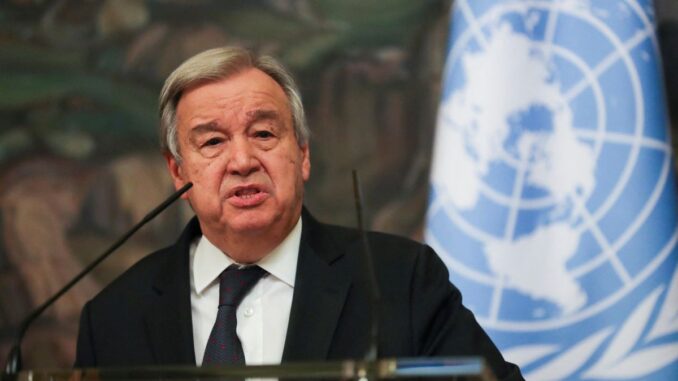
The largest annual gathering of global leaders returned in person to a world divided by multiple crises headed by the war in Ukraine, as the UN General Assembly opens.
The world is in “great peril, and paralyzed” United Nations (UN) Secretary-General Antonio Guterres warned the 77th session of the UN General Assembly kicked off on Tuesday.
After the COVID-19 pandemic restricted in-person attendance the previous two years, more than 150 heads of state and government were expected to attend the annual gathering in New York.
Guterres told them that nations were “gridlocked in colossal global dysfunction” and weren’t ready or willing to tackle the major challenges that threaten the future of humanity and the fate of the planet.
“Trust is crumbling, inequalities are exploding, our planet is burning. People are hurting, with the most vulnerable suffering the most,” he said.
The UN Chief said there is hope, stressing that cooperation and dialogue are the only path forward, he warned that “no power or group alone can call the shots.”
ALSO SPEAK: World bids final farewell to Queen Elizabeth, laid to rest beside husband, Prince Philip
“Let’s work as one, as a coalition of the world, as united nations,” he urged leaders gathered in the vast General Assembly hall.
The war in Ukraine and mounting economic and environmental crises would be top of the participants’ minds.
Germany stresses Ukraine global impact before UN summit
The UN made a special exemption for Ukrainian President Volodymyr Zelenskyy to prerecord his speech because of the “ongoing foreign invasion” and military hostilities that require him to carry out his “national defense and security duties.”
“This year, Ukraine will be very high on the agenda. It will be unavoidable,” top EU diplomat Josep Borrell told reporters in New York.
“There are many other problems, we know. But the war in Ukraine has been sending shock waves around the world,” he added.
The loss of important grain and fertilizer exports from Ukraine and Russia has triggered a food crisis, especially in developing countries, and inflation and a rising cost of living in many others.

German Chancellor Olaf Scholz was scheduled to speak on the first day.
His Foreign Minister Annalena Baerbock vowed to support countries hardest hit by the fallout from Russia’s invasion of Ukraine.
“The brutality of Russia’s war of aggression and its threat to the peace order in Europe have not blinded us to the fact that its dramatic effects are also clearly being felt in many other regions of the world,” Baerbock said.
“We are not only responsible for Europe, but together for the whole world,” she said.
On her first international visit as prime minister, British Prime Minister Liz Truss promised billions more in financial and military aid to Ukraine.
Other leaders to speak Tuesday include Turkish President Recep Tayyip Erdogan, who has staked out ground as a broker between Russia and Ukraine, including through a deal to ship out badly needed grain to the world.
Russian President Vladimir Putin was not expected to attend the meeting. Instead, he sent Foreign Minister Sergei Lavrov to speak on Moscow’s behalf.
Ahead of the meeting, Putin vowed Russia “will not deviate from our sovereign course.”
Putin said that Russia as a permanent member of the Security Council would work towards unity, help tackle global problems and “contribute to the settlement of acute regional conflicts”.
Macron to meet Raisi to urge revival of nuclear deal
Also high on the agenda for the UN week will be Iran, whose hardline president, Ebrahim Raisi, is traveling to the General Assembly for the first time.
He will meet French President Emmanuel Macron on the sidelines of the gathering.
Ahead of his arrival, Raisi said that Iran wanted “guarantees” before returning to a nuclear deal.

“We are repeatedly saying there is no better offer for Iran,” French Foreign Minister Catherine Colonn said. “It’s up to them to make a decision.”
Guterres urges taxes to help climate victims
The UN Chief reminded world leaders that the climate crisis also need attention, saying “polluters must pay.”
He urged rich countries to tax windfall profits of fossil fuel companies and use that money to help countries harmed by the climate crisis and people who are struggling with rising food and energy prices.
“The fossil fuel industry is feasting on hundreds of billions of dollars in subsidies and windfall profits while household budgets shrink and our planet burns,” he said.
He also spelled out where the money should be spent.
“Those funds should be redirected in two ways: to countries suffering loss and damage caused by the climate crisis; and to people struggling with rising food and energy prices.”
On Tuesday, more than 200 NGOs called for urgent action from leaders at the General Assembly to “end the spiraling global hunger crisis.”
“Around the world, 50 million people are on the brink of starvation in 45 countries,” they said, adding that as many as 19,700 people are estimated to be dying of hunger every day, which translates to one person every four seconds.

